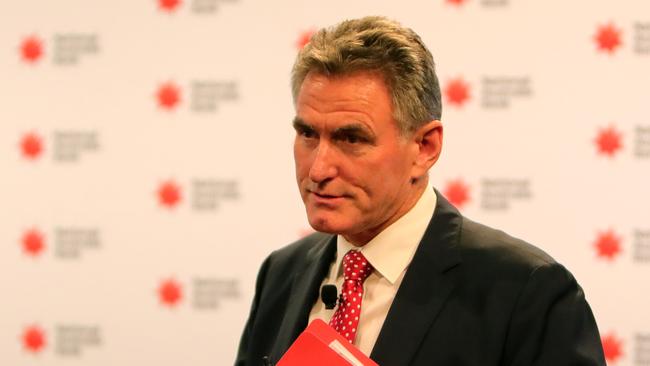McEwan sees ‘profound’ impact on business
National Australia Bank has set aside $807m for COVID-19 related loan losses, but warned they could balloon to $3.8bn.

National Australia Bank has set aside $807m for COVID-19 related loan losses, but warned they could balloon to $3.8bn if a severe recession grips the economy and it takes longer for key sectors to recover.
NAB is the nation’s largest business bank, giving it better insight into the health of the sector as the pandemic continues to stymie economic activity.
Chief executive Ross McEwan said while the bulk of NAB’s business customers entered the storm in good shape, COVID-19’s impact was “pretty profound”.
“For some sectors the path will be tougher and more drawn out,” he added, noting not all businesses would ride out the disruption and NAB was prepared to have an “honest conversation” with those customers.
Investors are not confident that NAB will be able to contain its COVID-19 provision at $807m, even under the bank’s own assumptions for negative gross domestic product and unemployment peaking at 11.7 per cent.
“It’s early in the cycle and they’ve done probably what they need to do for now,” said Nathan Parkin, an investment director at Ethical Partners Funds Management. He added that depending on the economic fallout the bank may need to increase provisions.
JPMorgan said the economic adjustments outlined by NAB were not as high as the broker’s estimate. “The economic adjustment through the collective provision of circa $800m was lower than our $900m assumption,” it told clients on Monday.
UBS analysts agreed, labelling the NAB credit overlays related to the pandemic “slightly light”.
“It assumes about an 87 per cent chance of its base case ‘V’ shaped recovery and about a 13 per cent chance of its more ‘severe downside’. Further top-ups may be required in the second half 2020,” they said.
The bank’s credit impairment charge surged 147 per cent in the six months ended March 31, from the prior half, but the underlying charge excluding COVID-19 provisions remained low at 12 basis points of gross loans.
NAB’s results presentation showed it had approved repayment deferrals for 34,000 businesses and approved more than 1500 customers under the federal government’s 50 per cent guaranteed loan scheme.
Since the crisis began, the bank has fielded more than 650,000 calls from business and personal customers and approved loan repayment deferrals for 70,000 home loan borrowers.
The bank also provided data from its payment terminals which showed a near 70 per cent drop in transactions from the accommodation and food services sector, followed by a 50 per cent reduction in arts and recreational industries.
Mr McEwan said it was “too early to tell” if the COVID-19 loan losses would exceed those during the global financial crisis, but noted that even under NAB’s severe scenario where the provision hits $3.8bn the bank would maintain “sufficient profitability”.
“We’ve gone through every portfolio and dissected it into parts and said who’s likely to be most impacted, who’s likely to be medium impacted, who’s likely to be not impacted at all? And then had a good look at what will happen.”
NAB’s presentation showed the commercial real estate book comprising mainly retail, office and industrial exposures. The air travel and related services book includes lending to airlines, plane leasing firms and airports, while the retail book has a $150m exposure to department stores and more than 52 per cent of it reflected discretionary retail.
NAB’s chief risk officer Shaun Dooley said the bank had undertaken a granular assessment of its lending book, but it expected the loss profile of this downturn will be different to previous economic shocks.
“We’ve not taken a one size fits all approach. Every single day we are reviewing the data,” he added, saying NAB was particularly watching commercial real estate closely during the crisis.
Mr McEwan said parts of the commercial real estate sector, including warehousing business and distribution for big online retailers or supermarkets, were faring well, while those predominantly representing discretionary retail were doing it tough.




To join the conversation, please log in. Don't have an account? Register
Join the conversation, you are commenting as Logout